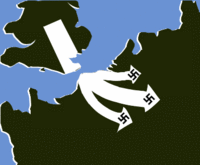
Now everyone else has hashed and rehashed the Euros, here's a wee review. At every level, the silver lining comes with a black cloud attached. (image from b3ta)
Scottish good news: It was our best ever result in a Scotland-wide election, even above the famous 1989 surge, and we continue to move up as the Liberals move down again.
Scottish bad news: The Westminster parties have never been less trusted, and we should have done better. Despite their total chaos, Labour won almost three times as many votes as us.
UK good news: Our friends down south saw the biggest increase in their support of any party, and came out on top across Brighton and Hove and also Norwich, the party's two top targets for the UK General.
UK bad news: Seeing Nazis get elected, especially in the Northwest, where just 5,000 more Green votes would have seen the wonderful Peter Cranie returned to Europe instead of the vile Nick Griffin. The BNP's vote fell and they gained seats. More than a quarter of a million more people voted Green, but we got no more seats, narrowly missing out in a few regions.
European good news: Greens were the big winners across the continent, with great results in France, Germany and elsewhere.
European bad news: The far right in Hungary, Netherlands and elsewhere also did well. Nick Griffin will have plenty of friends, even if they're furriners.
Looking again at the Scottish result, it seems clear that the SNP have positioned themselves as anti-Westminster, despite some shocking abuses of the expenses scheme, and so were ideally placed to pick up the reform/protest votes here that we might otherwise have won.





I ran the Yorkshire & Humber votes through the Sainte-Laguë method, since it's generally accepted as being ‘more proportional’ (less biased towards the larger parties) than the d'Hondt method used in Great Britain MEP elections. That yielded a Green MEP, at the expense of one of the Conservatives'.
Sainte-Laguë was used elsewhere in these elections (Germany, for instance). It seems slightly perverse to have proportional representation but intentionally not choose the most proportionally of methods with otherwise identical advantages and disadvantages.
Oi! There are 3 target constituencies for the Green Party in England, the third being Lewisham Deptford, where we also polled very well last Thursday. Across the whole borough (which included some very weak parts where we normally only poll a few percent in council elections) we polled 18% and came second to Labour, but in Lewisham Deptford constituency itself, our vote was much higher (around 23%), and either neck and neck with or ahead of Labour (can't be v scientific on this as the borough-wide postal votes were mixed in with the constituency votes).
Brighton Pavilion is our number one target seat, followed by Norwich South and Lewisham Deptford (in no particular order). Sorry if this seems a bit petty, but we don't like being ignored!
Great blog btw and glad I can comment on it now - have wanted to before, but the openID thing never worked for me on this site for some reason.
Stupid question to ask, but would you really want to win a seat through a protest vote? That means your message isn't getting through, and the voters are unreliable and finicky when it comes to the next vote.
I'd rather see the Green Party have organic growth (excuse the phrase!). I think I saw the figure of a 0.5% rise in Scotland, so you know you have a core of supporters there that can be built upon.
Of course, the counter argument is that once you get people to vote for you once you can then dazzle them with your brilliance, and 4 years with a Green MEP is better than 4 years without one.
Hi Sue, apologies for that: I hadn't seen the Deptford results. The banner on the GPEW site just talks about Norwich and Brighton!
And Despairing, all parties combine core votes with support from floating voters, and we definitely need to do better at the latter!
Also, Smylers, that's interesting: where would you rate Sainte-Laguë versus STV (or Borda, STV's poor cousin)?